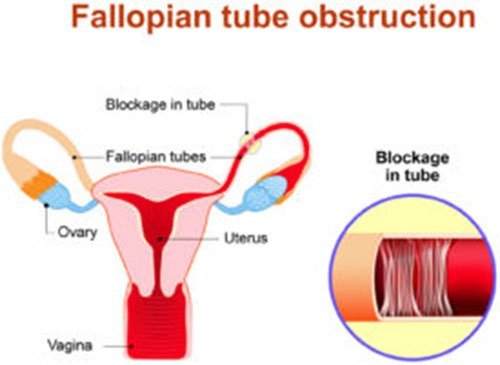Advanced Female Infertility Treatment In India⭐
by Ajit Yadav Interventional Radiology India

Hydrosalpinx is the name for a condition in which a woman’s fallopian tube becomes blocked with fluid.
There are different causes for this condition and symptoms can vary depending on the individual. Some women do not experience any symptoms,
but hydrosalpinx can have a severe impact on fertility.
Hydrosalpinx and infertility
Anyone with hydrosalpinx should seek professional advice for planning a pregnancy.
During conception, the egg travels from an ovary along the fallopian tube to the uterus. Hydrosalpinx causes the fallopian tube to become blocked with fluid, so the egg cannot pass down the tube, Also, the fimbria that help to draw the egg from the ovary into the tubes can become stuck together.
If only one fallopian tube is blocked, it is still possible to conceive without intervention, as eggs from the other ovary will still be able to make it to the uterus.
There is also a chance that the fluid build up could leak into the uterus and interfere with the embryo implanting itself properly.
Treatment and management
The most common treatment for a woman with hydrosalpinx is to have surgery to remove the affected tube. This type of surgery is known as salpingectomy. Surgery may also be offered to remove scar tissue or other adhesions that could be affecting fertility. If endometriosis is found to be the cause, doctors can also remove the endometrial growths.
Another possible treatment is sclerotherapy. Sclerotherapy is where an ultrasound-guided needle is used to draw fluid out of the affected tube. A special chemical, called a sclerosing agent, is then injected, which should prevent the fluid from building back up again.
Interventional ultrasound sclerotherapy before IVF is a very effective and acceptable prophylactic intervention alternative to salpingectomy for patients with hydrosalpinx, with no adverse effect on ovarian reserve and responsiveness during the IVF procedure.
Interventional ultrasound sclerotherapy before the IVF cycle can improve the endometrial receptivity and pregnancy rate.
Fallopian tube recanalization (FTR) is a nonsurgical procedure to clear blockages in the fallopian tubes, part of a woman’s reproductive system.
What are fallopian tubes/uterine tubes ?The fallopian tubes are important for female fertility. They are the passageways for the eggs to travel from the ovaries to the uterus. During conception:The ovary releases an egg, which travels into the fallopian tube.Sperm travels into the fallopian tubes to fertilize the egg.The resulting embryo is nourished and transported to the uterus where the pregnancy continues.A common cause of female infertility is a blockage of the fallopian tubes, usually as the result of debris that has built up. Occasionally, scarring from surgery or serious infection can lead to a blockage as well.
What happens during a fallopian tube recanalization?Fallopian tube recanalization (FTR) is a nonsurgical procedure our interventional radiologists use to treat these blockages. Recanalization is the medical term for “reopening.”During the procedure, which does not require any needles or incisions, we will:Place a speculum into the vagina and pass a small plastic tube (catheter) through the cervix into the uterus.Inject a liquid contrast agent (sometimes called a dye, although nothing is stained) through the catheter.Examine the uterine cavity on a nearby monitor using an X-ray camera.Obtain a hystero-salpingogram or HSG. Literally, that means a “uterus-and-fallopian-tube-picture.”Determine if there is a blockage and if it is located on one or both fallopian tubes.Thread a smaller catheter through the first catheter and then into the fallopian tube to clear the blockage.More than 90 percent of the time, we can reopen at least one blocked fallopian tube and restore normal function.
To schedule an appointment with Dr. Ajit Yadav, please contact:
Name: Interventional Radiology India
Address: Sir Ganga Ram Hospital, Old Rajendra Nagar, Delhi — 110060 India
Phone: 011 42251897, +91–9958474870
Website: www.interventionalradiologyindia.comYou can also search for these treatmentsProstate Embolization treatment in Delhi, Uterine fibroid treatment in Delhi, Uterine artery embolization treatment Delhi, Thyroid ablation treatment in Delhi, Interventional Radiologist in Delhi, Pin hole surgery in Delhi, BPH Treatment in Delhi, TARE Treatment in Delhi, Lymphangiography Treatment in Delhi, PAE Treatment in Delhi, Prostate Embolization Treatment in India, Uterine Fibroid Treatment in India, Uterine Artery Embolization treatment in India, Thyroid Ablation treatment in India, Interventional Radiologist in India, Pin hole surgery in India, BPH Treatment in India, TARE Treatment in India, Lymphangiography Treatment in India, PAE Treatment in India, Thyroid Treatment in India, Thyroid ABLATION Treatment in India, Interventional Radiologist In India, Non Surgical Treatment in India, Varicocele Embolization treatment in India, Female Infertility Treatment in India, Non-Surgical Treatment in India
Sponsor Ads
About Ajit Yadav  Interventional Radiology India
Interventional Radiology India
7 connections,
0 recommendations,
56 honor points.
Joined APSense since, April 10th, 2023, From Delhi city, India.
Created on Nov 22nd 2023 03:14. Viewed 68 times.
Comments
Please sign in before you comment.




